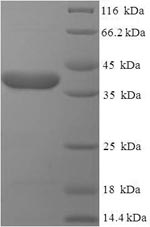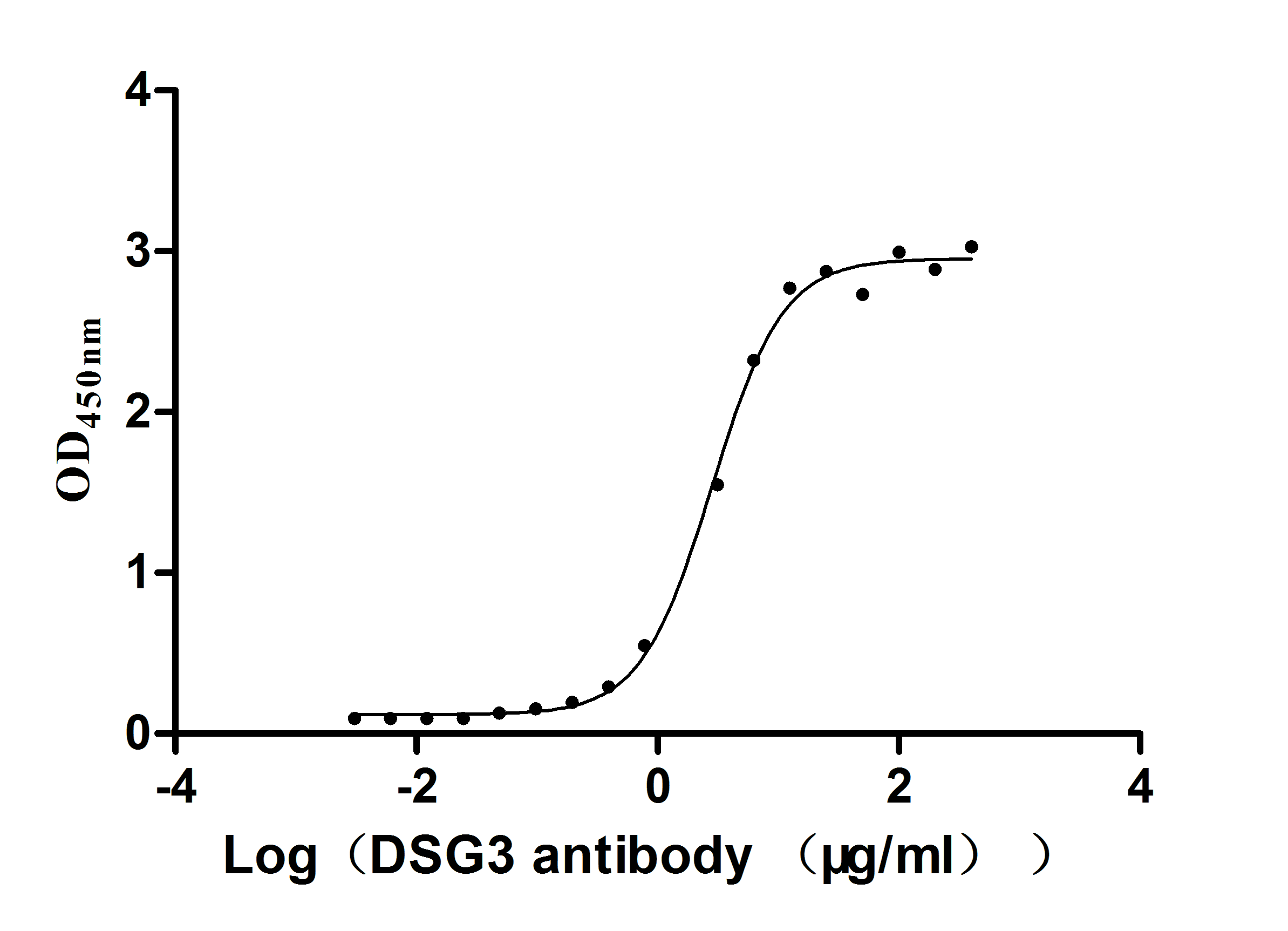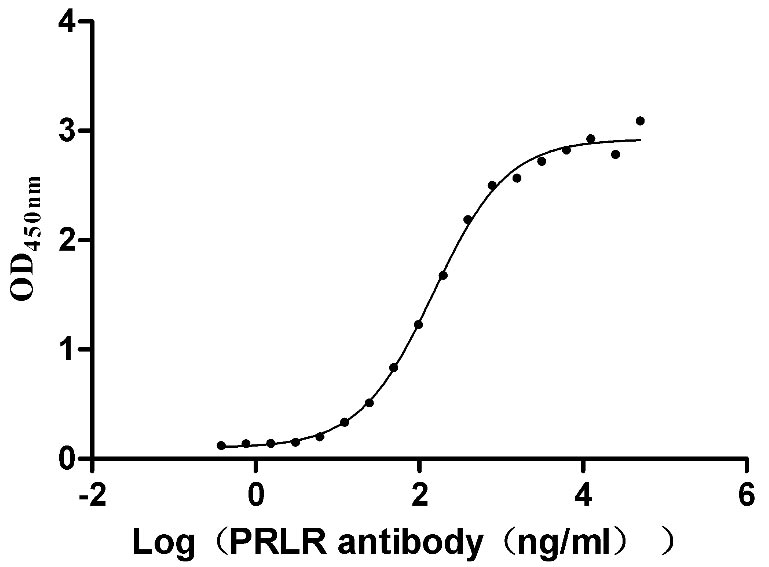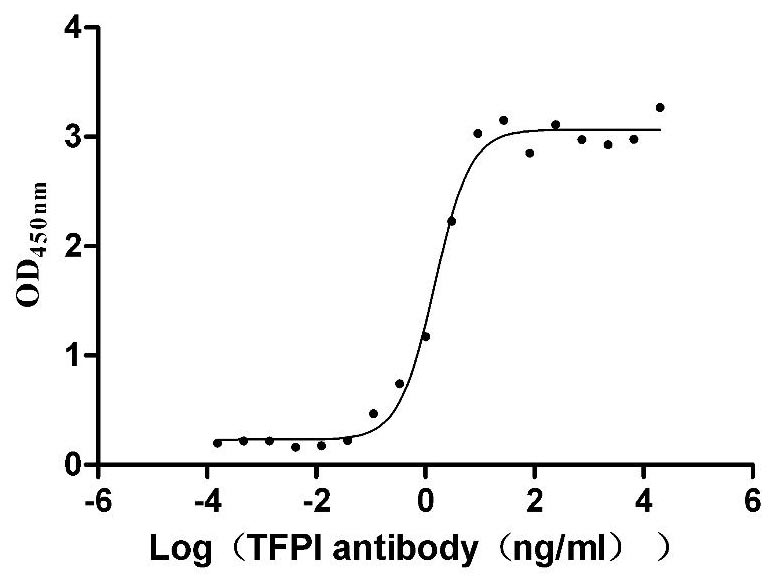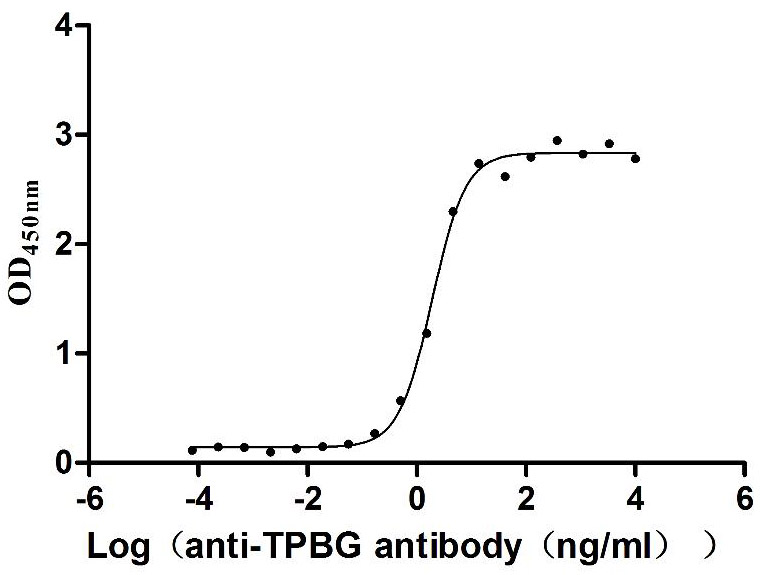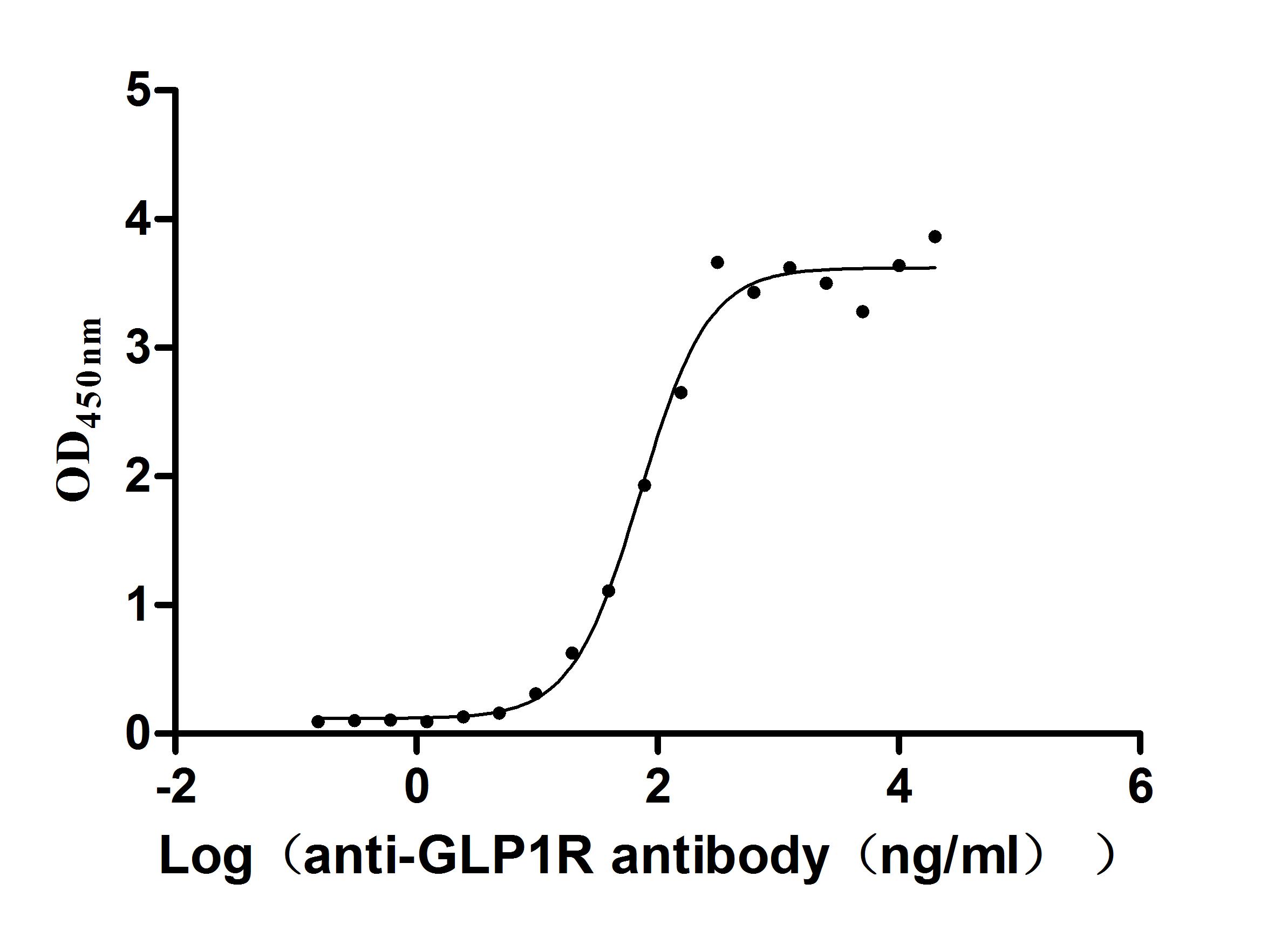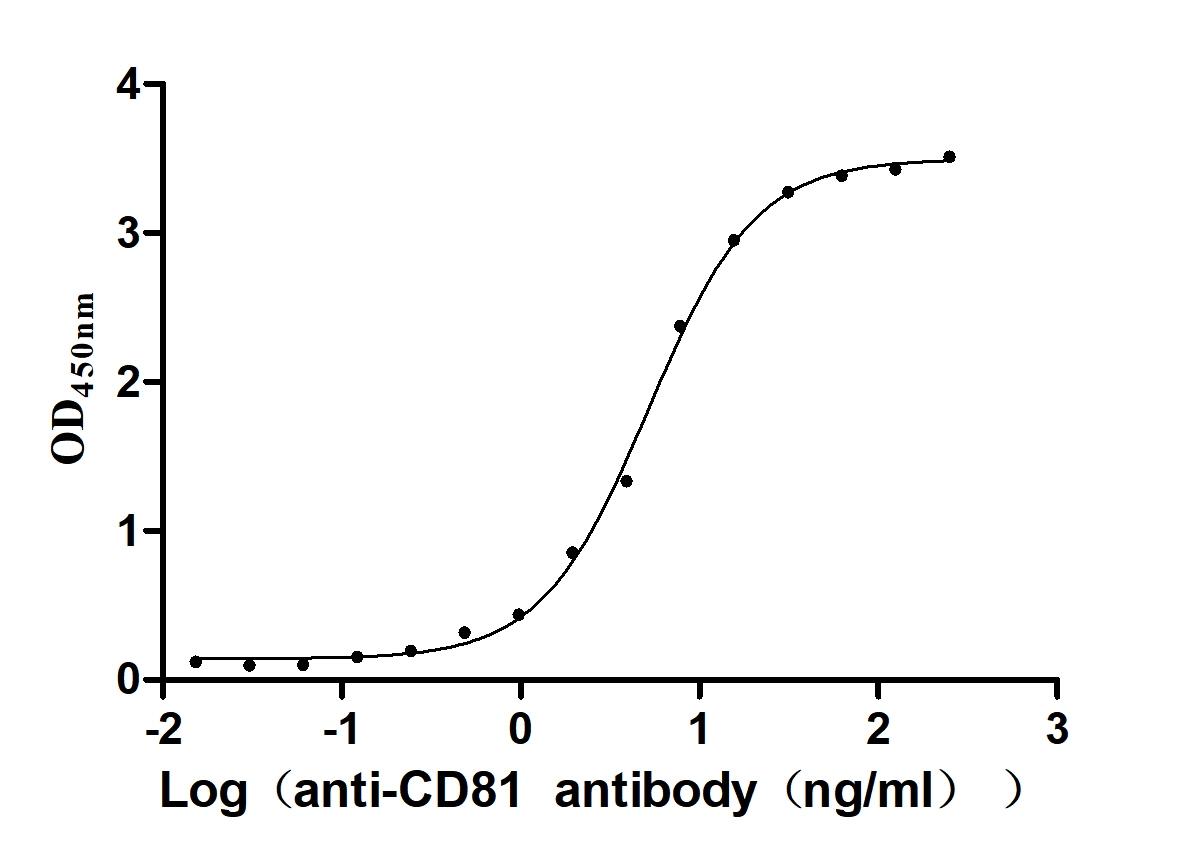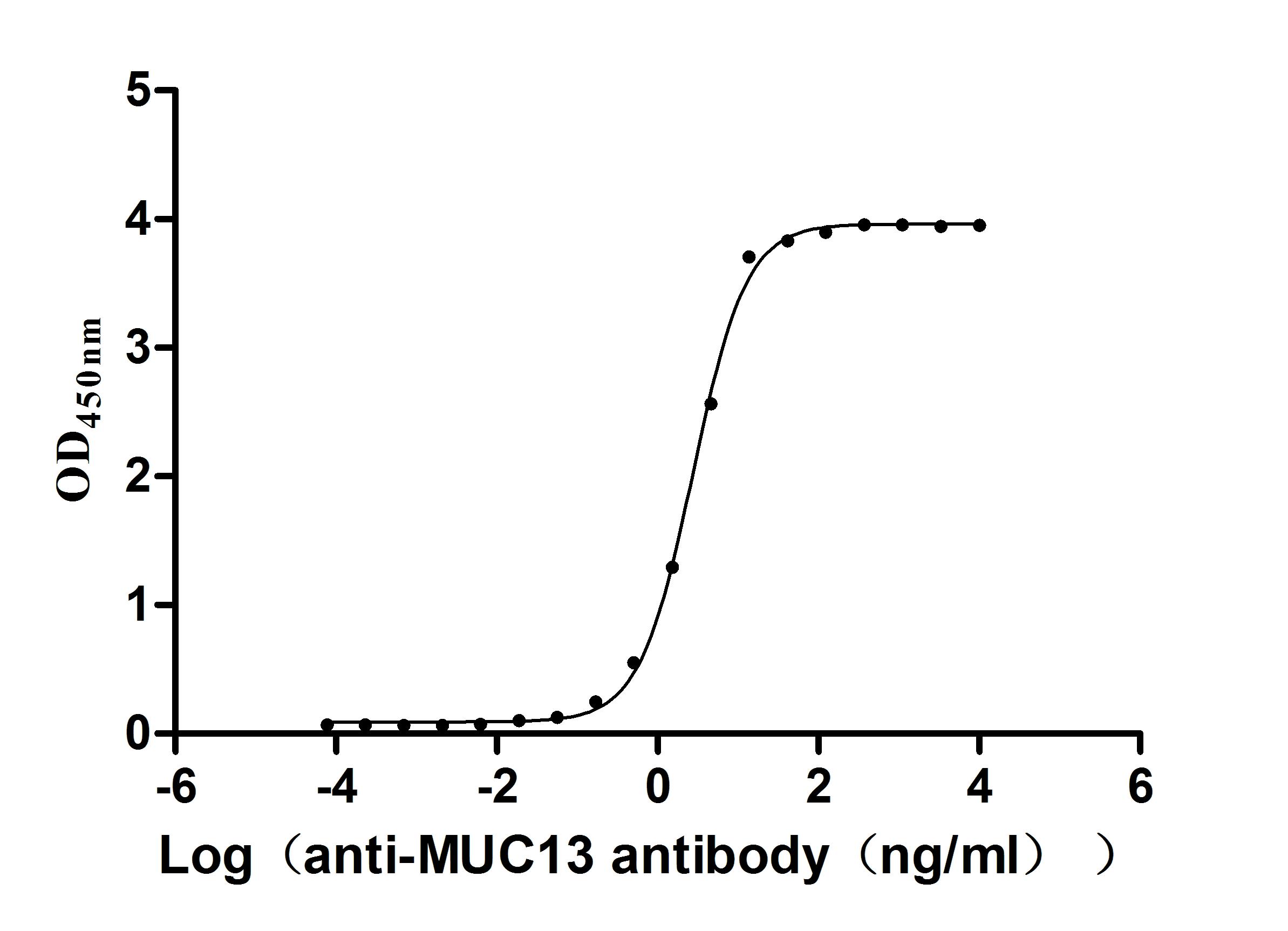Recombinant Human Receptor-binding cancer antigen expressed on SiSo cells (EBAG9), partial
-
货号:CSB-EP007355HU
-
规格:¥1344
-
图片:
-
其他:
产品详情
-
纯度:Greater than 90% as determined by SDS-PAGE.
-
基因名:
-
Uniprot No.:
-
别名:BAG9; Cancer associated surface antigen; Cancer associated surface antigen RCAS1; Cancer-associated surface antigen RCAS1; EB9; EBAG 9; EBAG9; Estrogen receptor binding fragment associated gene 9 protein; Estrogen receptor binding site associated antigen 9; estrogen receptor binding site associated; antigen; 9; Estrogen receptor-binding fragment-associated gene 9 protein; PDAF; RCAS 1; RCAS1; RCAS1_HUMAN; Receptor binding cancer antigen expressed on SiSo cells; Receptor-binding cancer antigen expressed on SiSo cells
-
种属:Homo sapiens (Human)
-
蛋白长度:Cytoplasmic Domain
-
来源:E.coli
-
分子量:37.2kDa
-
表达区域:28-213aa
-
氨基酸序列RSGRGRKLSGDQITLPTTVDYSSVPKQTDVEEWTSWDEDAPTSVKIEGGNGNVATQQNSLEQLEPDYFKDMTPTIRKTQKIVIKKREPLNFGIPDGSTGFSSRLAATQDLPFIHQSSELGDLDTWQENTNAWEEEEDAAWQAEEVLRQQKLADREKRAAEQQRKKMEKEAQRLMKKEQNKIGVKLS
Note: The complete sequence including tag sequence, target protein sequence and linker sequence could be provided upon request. -
蛋白标签:N-terminal 6xHis-SUMO-tagged
-
产品提供形式:Liquid or Lyophilized powder
Note: We will preferentially ship the format that we have in stock, however, if you have any special requirement for the format, please remark your requirement when placing the order, we will prepare according to your demand. -
缓冲液:Tris-based buffer,50% glycerol
-
储存条件:Store at -20°C/-80°C upon receipt, aliquoting is necessary for mutiple use. Avoid repeated freeze-thaw cycles.
-
保质期:The shelf life is related to many factors, storage state, buffer ingredients, storage temperature and the stability of the protein itself.
Generally, the shelf life of liquid form is 6 months at -20°C/-80°C. The shelf life of lyophilized form is 12 months at -20°C/-80°C. -
货期:Basically, we can dispatch the products out in 1-3 working days after receiving your orders. Delivery time may differ from different purchasing way or location, please kindly consult your local distributors for specific delivery time.Note: All of our proteins are default shipped with normal blue ice packs, if you request to ship with dry ice, please communicate with us in advance and extra fees will be charged.
-
注意事项:Repeated freezing and thawing is not recommended. Store working aliquots at 4°C for up to one week.
-
Datasheet & COA:Please contact us to get it.
相关产品
靶点详情
-
功能:May participate in suppression of cell proliferation and induces apoptotic cell death through activation of interleukin-1-beta converting enzyme (ICE)-like proteases.
-
基因功能参考文献:
- Data suggest that joint detection of receptor-binding cancer antigen expressed on SiSo cells (RCAS1) and carcinoembryonic antigen (CEA) can improve the diagnostic sensitivity and specificity. PMID: 26438059
- RCAS1 seems to be involved in creating tumor-induced inflammation in the tumor and its microenvironment PMID: 25773455
- High EBAG9 expression is associated with malignant pleural effusion in patients with lung cancer. PMID: 24720371
- Findings suggest that the histological effect of increased RCAS1 expression depends on its cellular source and that RCAS1 expression itself is a component of various signaling pathways in urothelial bladder cancer cells. PMID: 25674852
- suggests that RCAS1 has an apoptotic function via membranous/soluble expression pattern in OSCC cells. RCAS1 may thus affect tumor escape from immune surveillance in OSCC by inducing apoptosis PMID: 24885040
- RCAS1 could be a useful immunohistochemical biomarker, indicating not only tumor aggressiveness but also a poorer prognosis for patients with NSCLC. PMID: 24815841
- High EBAG9 expression is associated with tamoxifen resistance in breast cancer. PMID: 24119785
- sRCAS1 levels could have a clinical value for the diagnosis and management of lung cancer and could be used as a new tumor marker of lung cancer. PMID: 23881387
- RCAS1 may play an important role in the phenomenon of tumor escape from host immunological surveillance and in creating the immune tolerance for the tumor cells, as well as in the tumor microenvironment. PMID: 23164108
- The membrane molecule RCAS1 induces immune cell apoptosis via the RCAS1-RCAS1R pathway. PMID: 23563217
- The intensity of the suppressive profile of the cervical cancer microenvironment indicated by the presence of both RCAS1 and B7H4 on the front of the tumor and in the macrophages and fibroblasts infiltrating the cancer stroma PMID: 22530960
- RCAS1 protein may participate in thyroid neoplastic transformation and could be considered as a useful biomarker to improve diagnostic scrutiny. PMID: 22460085
- The immunoreactivity of RCAS1 on the cells present in the ovarian cancer microenvironment, was analysed. PMID: 21845402
- Data suggest that RCAS1 may be involved in the early stages of tumor progression in mobile tongue squamous cell carcinoma. PMID: 21804460
- We observed a statistically significant increase in the RCAS1-positive macrophage infiltration within the microenvironment of the molar lesions in patients with partial hydatidiform mole in comparison with those who exhibited complete hydatidiform mole. PMID: 20645939
- analyzed RCAS-1 as a biomarker in the serum of patients with head and neck squamous cell carcinoma PMID: 20571277
- EBAG9 acts as a negative regulator of a COPI-dependent ER-to-Golgi transport pathway in epithelial cells and shows pathogenetic principle in which interference with intracellular membrane trafficking results in the emergence of a tumor-associated glycome PMID: 20570965
- RCAS1 can be used as a serum tumor marker for diagnosis of pancreatic cancer. PMID: 19957811
- the RCAS1 putative receptor-expressing chronic myelogenous leukemia cell line K562 was co-cultured with SiSo, MCF-7, or soluble RCAS1 to follow RCAS1 secretion in apoptosis initiation PMID: 20079734
- NASP and RCAS1 proteins were more frequently expressed in ovarian cancer tissues than with normal ovarian tissue and serous cystadenomas and MRE11 was less frequently expressed PMID: 20164540
- Overrepresentation of EBAG9 may play a specific role in early stages of breast carcinogenesis. PMID: 11705872
- High expression of tumor-associated antigen RCAS1 in pancreatic ductal adenocarcinoma is an unfavorable prognostic marker PMID: 11992411
- RCAS1 is associated with ductal breast cancer progression PMID: 12054692
- modulates surface expression of tumor-associated, normally cryptic O-linked glycan structures and contributes indirectly to the antigenicity of tumor cells PMID: 12672804
- RCAS1 expressed on macrophages may play an important role in the induction of activated T-cell apoptosis in cases of HNL PMID: 12774924
- Overexpression of EBAG9 is correlated with advanced pathologic stages of prostate cancer PMID: 12845666
- RCAS1 may have role endometrial cancer invasiveness; overexpression associated with significantly poorer prognosis PMID: 12888828
- RCAS1 gene or protein expression may not correlate with tumor progression in esophageal squamous cell carcinoma PMID: 14534714
- The mean survival of patients who had primary hepatocellular carcinoma with high RCAS1 protein expression was significantly longer than that of patients with low expression. PMID: 14981953
- wide distribution of EBAG9 and its relation to advanced disease suggest that this protein may play important roles in epithelial ovarian cancer PMID: 15164121
- RCAS1 expression might be associated with progression of oral squamous cell carcinoma PMID: 15254686
- Serum RCAS1 appears to be valuable as a diagnostic index for biliary carcinomas, as well as for evaluating the progression of cancers during therapy. PMID: 15460847
- EBAG9 and Snapin have roles in controlling exocytosis processes PMID: 15635093
- Macrophages may negatively regulate erythropoiesis at least in part through the production of RCAS1 molecules. PMID: 15813909
- EBAG9 is a crucial regulator of tumor progression and a potential prognostic marker for RCC. PMID: 15867365
- the estrogen-inducible EBAG9 gene-product and the 22-1-1 defined antigen are structurally and functionally separate antigens PMID: 15904507
- RCAS1 expression is informative for the follow-up of malignant mesothelioma patients and sRCAS1 in pleural fluid may be useful for the diagnosis of malignant mesothelioma. PMID: 16012715
- RCAS1 may contribute to acquisition of malignant uterine cervical phenotypic characteristics including invasion, metastasis, and tumor growth via connective tissue remodeling. PMID: 16112176
- RCAS1 and CAP may play a role in the downregulation of the maternal immune response during pregnancy and may participate in the initiation of the labor PMID: 16113565
- distribution of RCAS1 expression in normal female genital organs; significant positive correlation between age and RCAS1 expression; RCAS1 may affect metaplastic processes and tumor progression PMID: 16175077
- expression of RCAS1 is correlated with recurrence not only in carcinomas, but also in mesenchymal tumors PMID: 16211275
- metastatic lymph nodes from bile duct, gastric, colon and pancreatic cancer were investigated for RCAS1 expression PMID: 16273616
- RCAS1 expression in gliomas may play roles in tumor progression and tumor immune escape. PMID: 16595162
- The expression of RCAS1 by endometrial cells may favor the persistence of these cells in ectopic localization both in scar following cesarean section and in ovarian endometriosis. PMID: 16907986
- Significantly higher RCAS1 expression was noticed in tumor in comparison to stroma in patients with the presence of lymph nodes metastases. No such difference was observed in patients without the metastases. PMID: 17187007
- RCAS1 expression was simultaneous to the infiltration of activated immunological cells of tumor environment as well as decidua. The activity of immunological cells was selectively suppressed. PMID: 17187008
- High-level expression of RCAS1 is involved in the malignant transformation of endometrium, and RCAS1 coexpression with ER-alpha may be associated with development and metastasis of endometrial carcinoma PMID: 17466050
- The expression of RCAS1 in cervical cancer is significantly increased, and has correlation with malignant degree of cervical carcinoma. Some RCAS1-positive cervical cancer tissues are infected by HPV16. PMID: 17562271
- possible role of the RCAS1 protein in the development of pre-eclampsia through an immunological pathway. PMID: 17604121
- the drop of the RCAS1 level, which could be a result of an insufficiency of the compensatory immune response mechanisms in tubal mucosa (although these mechanisms are simultaneously preserved in endometrium), leads to tubal perforation. PMID: 17717421
显示更多
收起更多
-
亚细胞定位:Golgi apparatus membrane; Single-pass type III membrane protein. Note=According to PubMed:10426319, it also exists as a soluble form which has the same biological activities. The existence of such soluble form is however uncertain.
-
组织特异性:Widely expressed. Expressed in ovary, testis, prostate, thymus, muscle and heart, but not in small intestine, colon, lymph nodes, or peripherical blood lymphocytes. The protein is not detected in any of the above organs.
-
数据库链接:
HGNC: 3123
OMIM: 605772
KEGG: hsa:9166
STRING: 9606.ENSP00000337675
UniGene: Hs.409368
Most popular with customers
-
Recombinant Mouse Desmoglein-3 (Dsg3), partial (Active)
Express system: Mammalian cell
Species: Mus musculus (Mouse)
-
Recombinant Human IGF-like family receptor 1 (IGFLR1), partial (Active)
Express system: Mammalian cell
Species: Homo sapiens (Human)
-
Recombinant Human Prolactin receptor (PRLR), partial (Active)
Express system: Mammalian cell
Species: Homo sapiens (Human)
-
Recombinant Human Tissue factor pathway inhibitor (TFPI), partial (Active)
Express system: Mammalian cell
Species: Homo sapiens (Human)
-
Recombinant Macaca fascicularis Trophoblast glycoprotein (TPBG), partial (Active)
Express system: Mammalian cell
Species: Macaca fascicularis (Crab-eating macaque) (Cynomolgus monkey)
-
Recombinant Human Glucagon-like peptide 1 receptor (GLP1R), partial (Active)
Express system: Mammalian cell
Species: Homo sapiens (Human)
-
Recombinant Human CD81 antigen (CD81), partial (Active)
Express system: Mammalian cell
Species: Homo sapiens (Human)
-
Recombinant Human Mucin-13(MUC13),partial (Active)
Express system: yeast
Species: Homo sapiens (Human)

